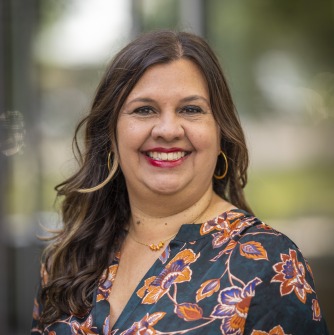| Contact |
|---|
Elisa Castillo, PhD, of Salem, will be the first to fill a new senior level role created by Salem State University to prepare the university to better serve students of color. Castillo has been named assistant vice president of Hispanic Serving Institution (HSI) and Minority Serving Institution (MSI) initiatives, a role she will assume in July 2023.
Salem State is the first of Massachusetts’ state universities, and one of few nationwide, to launch a senior position focusing on HSI and MSI initiatives. Castillo will report to the vice president of diversity and inclusion.
“When we make things better for a group that has been historically underserved, we also make them better for everyone else,” said Castillo. “I’m honored to help Salem State grow its capacity to serve the students of today and tomorrow, and to center that conversation on our growing intersectional Hispanic, Latinx and BIPOC student population.”
HSI status is a designation of the U.S. Department of Education for institutions at which 25 percent of students identify as Hispanic. MSIs refer to Historically Black Colleges and Universities, Hispanic Serving Institutions, Tribal Colleges and Universities, and Asian American and Pacific Islander Serving Institutions.
Salem State serves a 22 percent Hispanic and Latinx student population, and demographic trends indicate that this number will be 25 percent by 2025. Massachusetts has six HSIs, and Salem State leaders expect the university to be the first public four-year institution to reach this designation.
“I’m among many on campus who have long looked to Dr. Castillo for her guidance on a range of topics, from diversity and inclusion to closing opportunity gaps, addressing student health and well-being, and, of course, her invaluable counsel throughout the COVID-19 pandemic,” said President John D. Keenan. “Dr. Castillo has a talent for identifying student needs and partnering across campus to drive change. As Salem State approaches federal HSI and MSI status, Dr. Castillo’s record of success and dedication to our students make her exceptionally qualified for this role. I’m excited for our entire campus to benefit from her impact in an even larger way.”
Castillo has served Salem State’s student life division for nearly two decades after joining the university in 2005. In her most recent role as associate dean of students for wellness, Castillo co-lead of the campus’s response to the COVID-19 pandemic, expanded student access to mental health services, and added counseling staff dedicated to serving BIPOC and LGBTQIA+ students. She has added student programming and resources that promote sexual health and wellness and address trauma, relationship violence, and campus hunger.
A leader in diversity and inclusion efforts throughout her time on campus, Castillo has been engaged in crafting the Salem State’s diversity statement, embedding learning about diversity and power dynamics into the general education curriculum, conducting a campus climate survey and hiring a vice president of diversity and inclusion.
Castillo, along with Interim Vice President of Diversity and Inclusion Keja Valens, co-leads Salem State’s HSI-MSI efforts. This includes overseeing a 40-member campus working group that is exploring how the institution can better serve students as an HSI and MSI, including through federal grants available to HSIs.
“Leading Salem State to being the first public four-year HSI in Massachusetts and becoming one of only a few people nationally to lead HSI and MSI initiatives from an assistant vice president position, Dr. Castillo will be a trailblazer on the North Shore, in our Commonwealth, and in the nation,” said Valens. “Dr. Castillo has always been a leader in efforts to meet the needs of a diverse student population. She works from a student-centered, trauma-informed, culturally inclusive, and solution-focused lens.”
Castillo grew up in Puerto Rico and is fluent in English and Spanish. She received her bachelor's degree in psychology from the Universidad de Puerto Rico- Mayagüez and her doctorate in counseling psychology from the University of Wisconsin-Madison, where her research focused on psycho-socio-cultural predictors of academic persistence for Latinx adolescents.
“Salem State’s diversity is its asset,” added Castillo. “Being able to serve all students will also serve our community and the Commonwealth as well. I appreciate that Salem State’s leadership understands the value of embracing our emerging HSI-MSI identity and is willing to dedicate resources to making this endeavor successful.”

